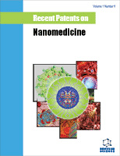Abstract
Curcumin (1,7-bis(4-hydroxy-3-methoxyphenyl)-1,6-heptadiene-3,5-dione) is found in the lipophilic extract of the rhizomes of turmeric (Curcuma longa). Numerous reports suggest that this natural compound possesses therapeutic benefit such as anti-tumor, anti-inflammatory and anti-oxidant activities. However, clinical tests have shown the bioavailability of conventional oral curcumin is low. Therefore the development of an efficient drug delivery system for curcumin is of considerable interest. Indeed, recent studies have demonstrated that a curcumin delivery system based on nanoscience and nanotechnology increases the therapeutic potential of this compound. Specifically, several nano-sized carriers such as phospholipid vesicles (liposomes), micelles, solid lipid nanoparticles, polymeric nanoparticles, emulsions, proteins and other molecular complexes have been developed for the efficient delivery of curcumin. Although curcumin itself is not a patentable compound, these formulations and the nanotechnology used to enhance the bioavailability of curcumin may lead to a patentable breakthrough for medical applications. This review focuses on curcumin nanoparticles for efficient delivery of the compound in biomedical applications.
Keywords: Anti-cancer drug, antioxidant, anti-inflammatory agent, bioavailability, curcumin, cyclodextrin, drug carrier, drug delivery, emulsion, liposomes, micelles, nanomedicine, nanocrystal, nanoparticles, nanotechnology, solid lipid nanoparticle, Curcumin, nanomedicine, Anti-cancer drug, curcumin nanoparticles
 6
6

